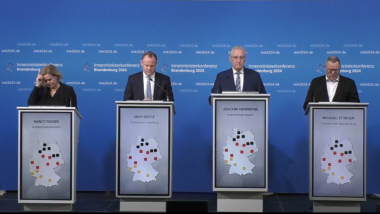Letzte Woche wurde im Eilverfahren der Data Retention and Investigatory Powers Act (DRIP) in Großbritannien verabschiedet. Mittlerweile wollen mehrere NGOs und Parlamentarier gegen das Notstandsgesetz vorgehen, dass nicht nur wie behauptet die Vorratsdatenspeicherung weiter aufrecht erhalten soll, sondern außerdem die Überwachungsbefugnisse Großbritanniens massiv ausweitet. Eine der Organisationen ist Liberty, die David Davis und Tom Watson dabei vertreten, eine richterliche Nachprüfung zu beantragen. Sie berufen sich auf das Recht auf Privatsphäre in der EU-Menschenrechtskonvention und der Grundrechtecharta. Libertys juristischer Vorstand James Welch begründet:
It’s as ridiculous as it is offensive to introduce an “emergency” law in response to an essay crisis. The court ruling that blanket data retention breached the privacy of every man, woman and child in the UK was more than three months ago. The Government has shown contempt for both the rule of law and Parliamentary Sovereignty, and this private cross party stitch-up, railroaded onto the statute book inside three days, is ripe for challenge in the Courts.
Auch die Open Rights Group will vor Gericht ziehen und bittet um Spenden, den Prozess und weitere Aktionen gegen Massenüberwachung zu finanzieren:
[A] major legal battle like this is going to be tough. The more resources we have, the more we’ll be able to do to stand up to DRIP.
Update Andre: Access, EDRi, Digitale Gesellschaft und andere NGOs haben einen offenen Brief an die EU-Kommissare für Binnenmarkt und Dienstleistungen Michel Barnier sowie die EU-Kommissarin für Innenpolitik Cecilia Malmström geschickt:
While the UK denies that the DRIP is a new instrument, despite the new elements it adds to the legislation, the UK has, nonetheless, claimed that there are additional safeguards. Consequently, even by the UK’s own analysis, this is a new instrument and therefore must go through the TRIS procedure as required by the Technical Standards Directive 98/34/EC.
The UK Government failed in its obligation to notify the European Commission of relevant impending legislation, a requirement that applies even if legislation is adopted under emergency procedure. The notification was filed on July 17, the same day it was adopted, directly violating the provisions of the Directive.
Furthermore, the UK Government’s request for emergency procedures to bypass the standstill period has neither a logical nor a legal basis. The UK was aware of the Advocate General’s opinion from December 12, 2013 that the Directive was likely to be overturned, and had known for the past 3 months that the CJEU in fact overturned the Directive. The Government’s claim that there was an emergency is false, and indeed manifestly absurd.
Additionally, it is difficult to imagine how the DRIP would be in line with the CJEU ruling.




netter versuch. aber dabei bleibt es auch……
Und wenn Brüssel das doch noch kippt, gibts nur den Europakritikern und Brit-Nazis Auftrieb. Darauf haben sies wohl auch angelegt…
dr. (?) uhl, krings, ziercke und die anderen betonköpfe sind bestimmt GAAANZ ohr wie man so was machen könnte bei uns…..
…natürlich grundrechtsschonend und alternativlos…und vielleicht gibts auch mehr netto vom brutto.